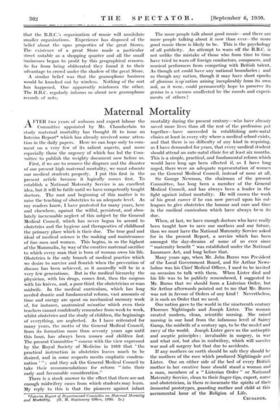Maternal Mortality
AFTER two years of arduous and expert labour the Committee appointed by Mr. Chamberlain to study maternal mortality has thought fit to issue an Interim Report* which has already received some atten- tion in the daily papers. Here we can hope only to com- ment on a very few of its salient aspects, and more especially those the urgency of which has led the Com- mittee to publish the weighty document now before us.
First, if we are to remove the disgrace and the disaster of our present high maternal mortality, we must educate our medical students properly. I put this first in the present article because it logically comes first. To establish a National Maternity Service is an excellent idea, but it will be futile until we have competently taught doctors. The root and beginning of this matter is to raise the teaching of obstetrics to an adequate level. As my readers know, I have protested for many years, here and elsewhere, against the wilful, persistent, and abso- lutely inexcusable neglect of this subject by the General Medical Council, which has never begun to accord to obstetrics and the hygiene and therapeutics of childhood the primary place which is their due. The true goal and ideal of medical science is the making and maintenance of fine men and women. This begins, in us the highest of the Mammalia, by way of the creative maternal sacrifice to which every man that is born of woman owes his life. Obstetrics is the only branch of medical practice which we desire to survive and flourish when the prevention of disease has been achieved, as it assuredly will be in a very few generations. But in the medical hierarchy the physician, with his drugs, comes first, then the surgeon with his knives, and, a poor third, the obstetrician or man midwife. In the medical curriculum, which has long needed drastic and fundamental reform, vast amounts of time and energy are spent on mechanical memory work of, for instance, anatomical minutiae which even their teachers cannot confidently remember from week to week, whilst obstetrics and the study of children, the beginnings of everything, are neglected. As I have reiterated for many years, the motto of the General Medical Council, from its formation more than seventy years ago until this hour, has always been women and children last. The present Committee " concur with the view expressed by the Royal Society of Medicine in 1919 that 'the practical instruction in obstetrics leaves much to be desired, and in some respects merits emphatic condem- nation ' " ; and they ask the General Medical Council to take their recommendations for reform "into their early and favourable consideration."
There is a stock answer to the effect that there are not enough midwifery cases from which students may learn. My reply to this is that the pioneers against infant
*Interim Report of Departmental Committee on Maternal Mortality and Morbidity. (H. M. Stationery Office, 1930. 2s.)
mortality during the present century—who have already saved more lives than all the rest of the profession put together—have succeeded in establishing ante-natal clinics at least in every city where a medical school exists, and that there is no difficulty of any kind in requiring, as I have demanded for years, that every medical student should attend an ante-natal clinic for at least six months. This is a simple, practical, and fundamental reform which would have long ago been effected if, as I have long urged, there were an adequate representation of women on the General Medical Council, instead of none at all.
Sir George Newman, the chairman of the present Committee, has long been a member of the General Medical Council, and has always been a leader in the fight against infant mortality. He will crown the work of his great career if he can now prevail upon his col- leagues to give obstetrics the honour and care and time in the medical curriculum which have always hem its due.
When, at last, we have enough doctors who have really been taught how to save our mothers and our future, then we must have the National Maternity Service asked for in the present Report, a service which has been amongst the day-dreams of some of us ever since "maternity benefit" was established under the National Insurance Act, and long before that.
Many years ago, when Mr. John Burns was President of the Local Government Board, and Sir Arthur News- holmc was his Chief Medical Officer, I used to be invited on occasion to talk with them. When Lister died and his life was to be publicly remembered, I suggested to Mr. Burns that we should form a Listerian Order, but Sir Arthur afterwards pointed out to me that Mr. Burns was not in favour of Orders of any kind! Nevertheless, it is such an Order that we need.
Our nation gave to the world in the nineteenth century Florence Nightingale and Joseph Lister. The woman created modern, clean, scientific nursing. She raised nursing in our land from the infamous level of Sairey Gamp, the midwife of a century ago, to be the model and envy of the world. Joseph Lister gave us the antiseptic and aseptic principles ; invaluable in surgery, in war and what not, but also in midwifery, which will survive war and all surgery but that due to accidents.
If any mothers on earth should be safe they should be the mothers of the race which produced Nightingale and Lister. One on either side of the bed of every British mother in her creative hour should stand a woman and a man, members of a " Listerian Order" or National Maternity Service, clean to their finger-tips, expert, nurse and obstetrician, in them re-incarnate the spirits of their immortal prototypes, guarding mother and child at this sacramental hour of the Religion of Life.
CRUSADER,






























 Previous page
Previous page